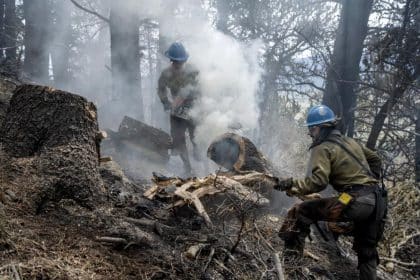Don’t Mean to Be ‘Guacward,’ but Avocados Are Killing Forests
COMMENTARY

My friends’ faces lit up recently when we walked into a grocery store and saw a bright display of avocados. “Let’s make guacamole!” they chimed in unison. I sighed and weighed whether to be the party pooper.
Then I explained how Americans eat so many avocados that Mexican forests are razed to grow more. Lands and water are stolen, people are killed and essential monarch butterfly habitat is harmed. One friend looked me in the eye and said, “You ruin everything.” The other friend said, “Well, let’s just buy one.”
I get it, really. Pretty much everybody loves avocados and they’re promoted as fostering health and happiness. But the hidden costs are increasingly horrific.
Before 1997, America didn’t even import avocados. Now they’re ubiquitous. Once you start looking, you notice them in everything — fast-food items, health food smoothies, fancy cocktails. They’re even in doughnut shops, dog food and supplements.
Most of the 3 billion pounds of avocados we consume each year come from the Mexican state of Michoacán, where living conditions for locals and wildlife are being sacrificed to fuel America’s insatiable avocado infatuation.
In an investigative report, the nonprofit group Climate Rights International found that popular grocery chains are stocking avocados tied to deforestation and violence. Community members, monarch butterfly defenders and journalists who speak out in Michoacán are being kidnapped, beaten or killed.
As consumers, we have the responsibility and power to catalyze change. The least we can do is stop buying conventional avocados from Mexico until the industry adopts standards to protect human rights and the environment.
You may be asking, “Don’t we need to support the avocado farmers?” But local, hardworking farmers aren’t actually benefitting much from our voracious avocado appetite. The big bucks from the avocado boom are concentrated in the hands of agribusiness.
Vulnerable communities are the ones paying for the water scarcity, pesticide pollution and land theft. The conversion of community forests and agricultural lands to avocado plantations by criminal actors are driving poverty and food insecurity.
Avocado demand has skyrocketed so high that it can’t even be met, so jobs aren’t at risk. But there’s reason to hope that avoiding mainstream avocados will hit corporate pockets hard enough for companies to adopt policies that protect farmers, communities and wildlife.
This isn’t some impossibly complex problem. Exporters and the U.S. Department of Agriculture already trace shipments back to specific sources to ensure that pests aren’t spread. It wouldn’t be a big lift for them to also ensure that avocados aren’t coming from newly deforested areas or stolen lands.
In the meantime, curbing demand will also help save the monarch butterfly. Monarchs fly from the northern U.S. and southern Canada to the mountains of Mexico to winter. Michoacán’s intact forests act as a blanket and hot water bottle to protect the butterflies until spring, when they fly north to lay the eggs that will birth the next generation.
Not only are protected monarch forests being felled, but the surrounding forests are also falling. The smaller and thinner the monarch forest patches become, the less able they are to provide habitat for the threatened butterflies at their most vulnerable stage. The future of the eastern monarch migration is literally all in this one basket.
Protecting existing forests is one of the most important things we can do to fight climate change, and climate change is already putting butterflies and forests at risk. And felling forests to grow water-hungry avocados in a region suffering from severe drought is making the entire ecosystem vulnerable to wildfires.
Locals report no longer having sufficient water for drinking, bathing and taking care of their animals. Every avocado we eat is importing 70 liters of water from a region where it is sorely needed.
Many people know we can help monarch butterflies by planting milkweed. But we can also help by eating fewer avocados — there’s lot of other stuff to dip our chips in — and seeking out organic, fair-trade and domestic avocados.
With the Super Bowl coming up, the time is ripe to put on our party pooper hats and have the conversations about literal “killer guacamole.” In the world we’ve built where wild spaces and vulnerable communities are increasingly at risk, we should do everything in our power to live more sustainably. The foods we eat and the dollars we spend change the world. Let’s make choices toward positive change — starting with avocados.
Tierra Curry is a senior scientist at the Center for Biological Diversity, where she leads the Saving Life on Earth campaign to end extinction. Curry can be reached on X.






















